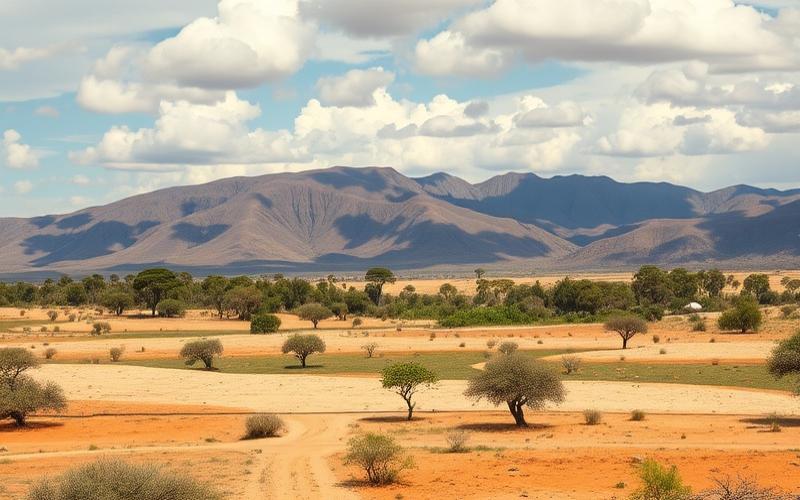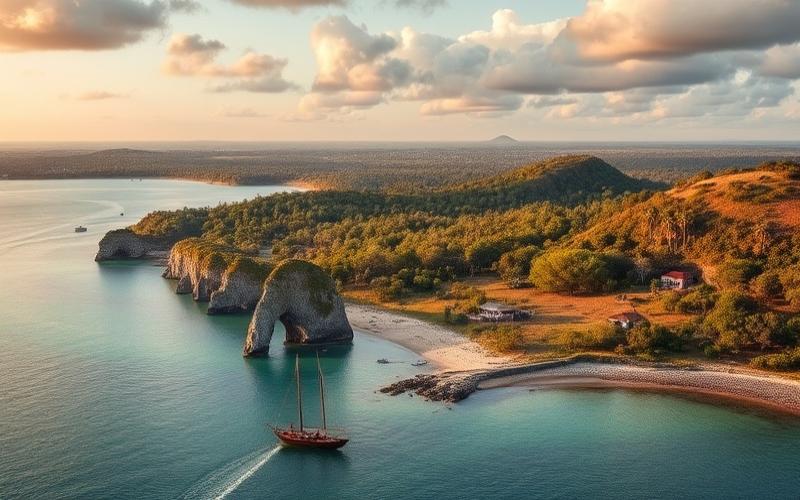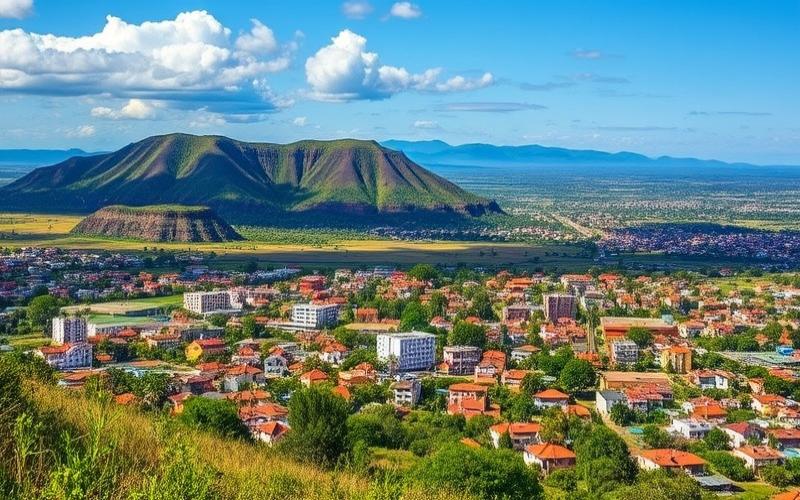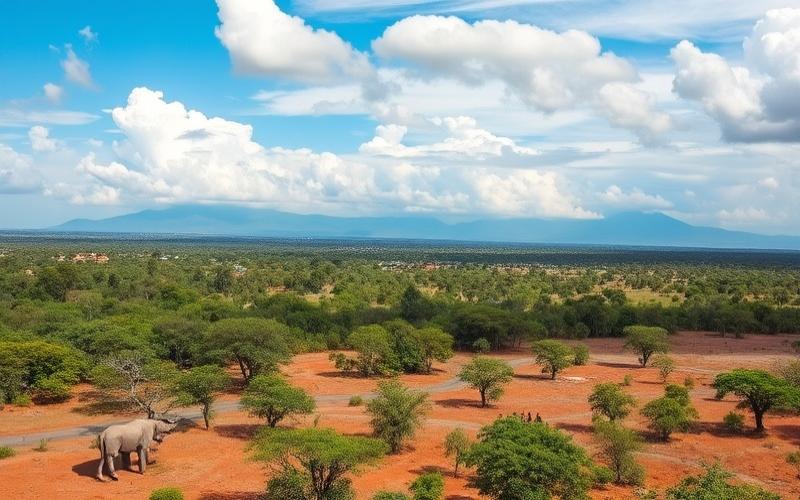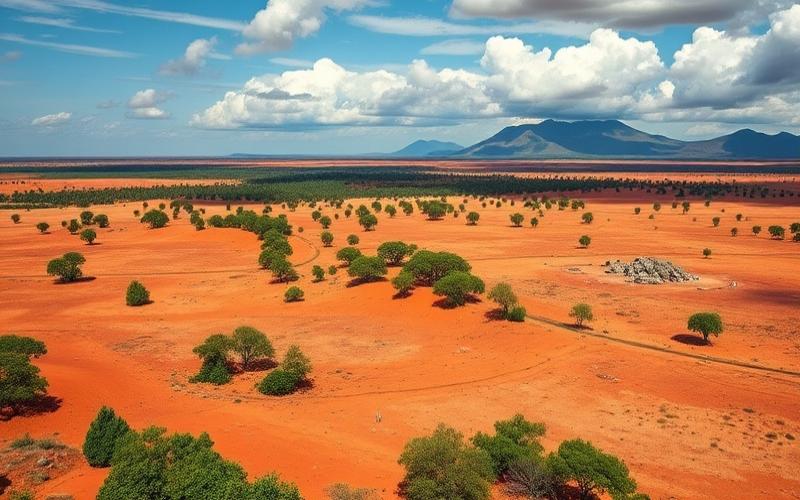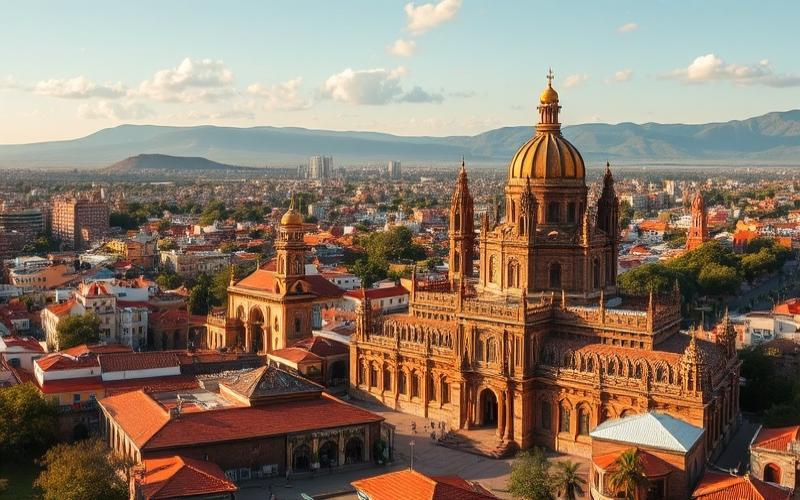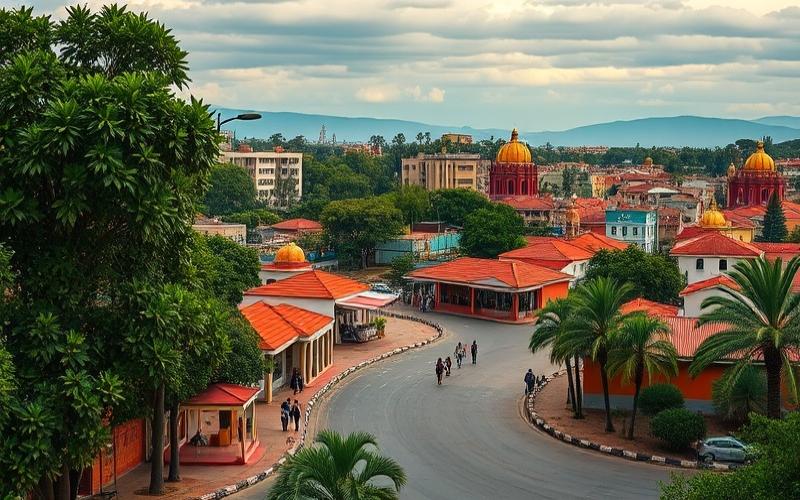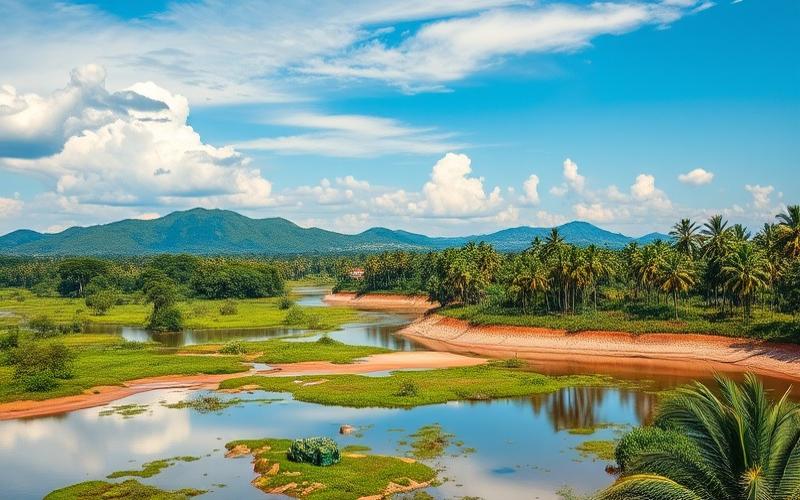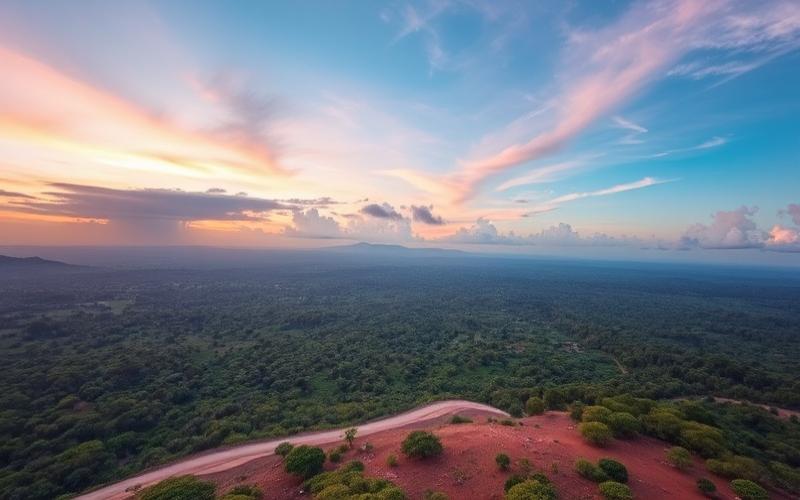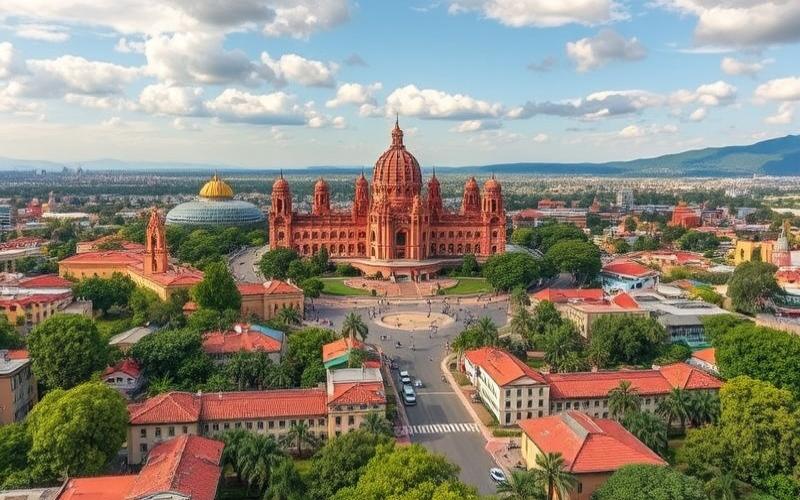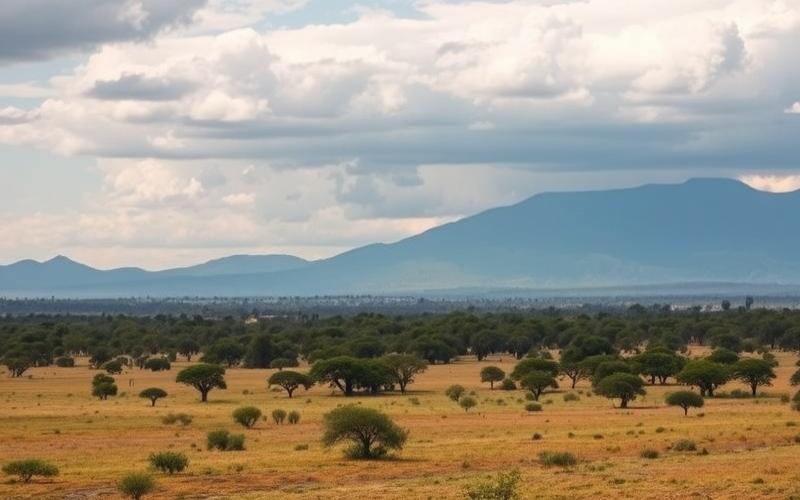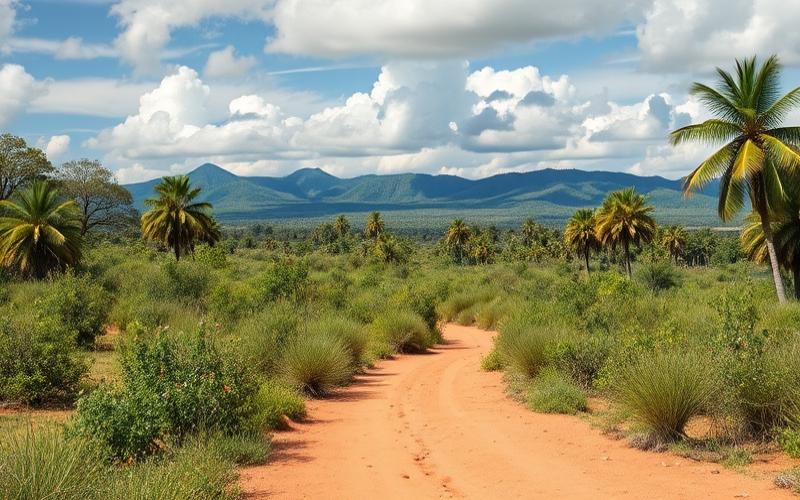
 Published on and written by Cyril Jarnias
Published on and written by Cyril Jarnias
Far from the battlefields yet not spared from the repercussions of international conflicts, Madagascar is feeling the impact of the war in Ukraine on its real estate market. While this Indian Ocean island nation has long been perceived as a promising environment for investors, geopolitical instability on the other side of the world has triggered economic fluctuations that have upended forecasts.
Global uncertainties have caused a rise in construction material prices and supply chain difficulties, thereby slowing local development projects and altering investor behavior. This complex context highlights the interconnection of economic markets in a world where geographical distance is no longer a barrier to influence.
The Geopolitical Consequences of the War in Ukraine on Madagascar
The Russo-Ukrainian conflict has generated significant repercussions for Madagascar, both diplomatically and economically, with indirect consequences on the real estate sector.
Geopolitical and Diplomatic Impact
Madagascar finds itself in a delicate position regarding the Russo-Ukrainian conflict. Although Malagasy authorities officially maintain neutrality, Russian influence is observable on the island. The “Friends of Russia in Madagascar” association, created in 2021 just before the war began, constitutes a recognized influence circle by the Kremlin and has about 1,000 members, including several former Malagasy students trained in the former USSR. This organization disseminates clear political support for Russia, despite the government’s official neutral stance.
Direct Economic Consequences
The war has caused major economic disruptions for Madagascar:
- Food dependency: Russia accounts for half of Madagascar’s wheat imports, creating a real threat to the country’s food security.
- Rising energy prices: The main transmission channel of the shock is the variation in oil prices, generating a deterioration in the balance of payments.
- Widespread increase in raw material prices in the energy and goods transport sectors, which remain dependent on oil.
Impacts on the Malagasy Real Estate Sector
| Factor | Impact on Real Estate | Potential Consequence |
| Rising energy costs | Increase in operating expenses | Reduction in real estate developers’ margins |
| Supply chain disruption | Difficulties accessing construction materials | Project slowdowns and increased delays |
| Economic instability | Reluctance of foreign investors | Decrease in major real estate projects |
| General inflation | Increase in construction costs | Rise in real estate prices |
The rising prices of imported construction materials directly affect the real estate sector. Materials needed for infrastructure production become more expensive and less accessible, which impacts construction costs and, consequently, the sale and rental prices of real estate properties.
Adaptation Prospects
Facing these challenges, Madagascar could consider adaptation strategies:
- Diversification of import sources for essential goods and basic products
- Development of local construction material production sectors
- Exploration of alternative economic partnerships to reduce dependency on countries involved in the conflict
The reconfiguration of international relations could also offer opportunities, particularly within the framework of the energy transition and the evolution of laws on natural resource governance in Africa.
Real estate investors in Madagascar must now integrate these geopolitical factors into their risk analysis and long-term investment strategies, taking into account the evolution of relations between Madagascar and the powers involved in the conflict.
Good to Know:
The war in Ukraine has caused geopolitical repercussions that indirectly affect Madagascar, particularly through altered economic and diplomatic relations with the involved global powers. Tensions and sanctions can influence Madagascar’s access to imported construction materials, creating cost increases that impact the local real estate sector. Furthermore, the global economic volatility induced by the conflict makes foreign investments more uncertain, which could slow real estate projects in Madagascar. Additionally, changes in trade with European countries, for example difficulties in supplying steel or cement, lead to an increase in construction prices, forcing contractors and buyers to revise their budgets and strategies. These elements underscore the importance of monitoring the evolution of geopolitical conditions, as they directly influence the Malagasy real estate market.
The Impact of the Ukrainian Crisis on the Malagasy Real Estate Market
The Ukrainian crisis has generated significant economic repercussions globally, also affecting the Malagasy real estate market. Madagascar, an economy vulnerable to international market fluctuations, has suffered the fallout from this major geopolitical instability.
Global economic disruptions have manifested in Madagascar mainly through the volatility of raw material and energy prices. This situation has directly impacted the construction sector, with a notable increase in the cost of imported materials. Similar to other markets like Albania, which experienced an increase in construction costs due to soaring energy and raw material prices, Madagascar has faced similar challenges.
Economic analysis conducted via a Dynamic Stochastic General Equilibrium (DSGE) model has highlighted the economic consequences of the war in Ukraine on the Malagasy economy. This study underscores the country’s particular vulnerability to fluctuations in global market goods prices.
| Factor | Impact on the Malagasy Real Estate Market |
| Construction costs | Significant increase due to inflation of imported materials |
| Foreign investments | Slowdown due to overall economic uncertainty |
| Real estate prices | Upward trend in certain segments, particularly urban areas |
| Local demand | Weakened by reduced household purchasing power |
The crisis has also affected foreign investment flows in Malagasy real estate. As observed in other emerging markets, investors have adopted a more cautious approach, favoring markets perceived as more stable. This capital reorientation has slowed several ongoing real estate projects in Madagascar, creating an uncertain investment climate.
Residential real estate prices have shown contrasting evolution:
- Moderate increase in sought-after urban areas
- Stagnation in peripheral zones
- Downward pressure in some tourist regions affected by the decrease in international tourism
The Malagasy government has attempted to implement measures to mitigate these impacts, including:
- Price controls on certain construction materials
- Streamlining administrative procedures for real estate projects
- Tax incentives to stimulate investment in the sector
Paradoxically, as observed in other markets such as Dubai, certain segments of the Malagasy real estate market have been able to benefit from specific opportunities. Investors seeking to diversify their portfolios in the face of European instability have shown interest in properties in strategic areas of Madagascar.
The crisis has also accelerated some pre-existing trends in the Malagasy real estate sector, including the digitalization of real estate services and the adaptation of offerings to meet the changing needs of clients, both local and international.
Inflation affecting the country since the health crisis, exacerbated by the Ukrainian conflict, has led to a decrease in the purchasing budget of many Malagasy households, limiting their ability to access property and altering the structure of real estate demand.
Good to Know:
The Ukrainian crisis has provoked global economic disruptions that have had a notable impact on the Malagasy real estate market; unstable exchange rates have led to an increase in the cost of imported construction materials, exacerbating expenses for local real estate developers. Currency fluctuations have made the supply of essential materials more complex, causing construction projects to become more expensive. In parallel, economic uncertainty has influenced foreign investment, with a slowdown observed in financial commitments to Malagasy real estate, particularly affecting the commercial sector. Despite this, government policies implemented have sought to mitigate these effects by promoting local investments, but they struggle to compensate for the inflation in residential real estate prices. While some see these challenges as opportunities for structural reforms, the context remains tense, requiring precise analysis of current trends to anticipate future developments.
The Influx of Ukrainian Refugees and the Housing Challenge in Madagascar
The Russo-Ukrainian conflict, initiated on February 24, 2022, by Russian President Vladimir Putin, continues to cause massive population displacements in 2025. This war has generated an unprecedented humanitarian crisis, with approximately 5.8 million refugees having fled Ukraine and more than 6 million internally displaced persons according to UN data.
In April 2025, the latest surveys show that despite a slight decrease from the previous peak of 16.9 million displacements, the situation remains critical. Approximately 4.2 million people have returned to their regions of origin, a quarter of whom are returning from abroad.
Facing this prolonged crisis, the International Organization for Migration (IOM) has established an ambitious response plan for 2025, aiming to help two million people in Ukraine. This plan focuses on the humanitarian and recovery needs of affected populations, while helping communities identify sustainable solutions to displacement.
Impact on Madagascar and the Real Estate Sector
Madagascar, although geographically distant from the conflict, has experienced an unexpected influx of Ukrainian refugees seeking refuge in the Indian Ocean. This situation has created considerable pressure on the local real estate market, particularly in urban areas like Antananarivo, Toamasina, and Nosy Be.
The table below illustrates the evolution of real estate demand in Madagascar since the arrival of Ukrainian refugees:
| Period | Rental Price Increase | Occupancy Rate | New Constructions |
| 2023 | +5% | 78% | 120 units |
| 2024 | +12% | 86% | 250 units |
| 2025 | +18% | 94% | 380 units |
Government Measures and Local Initiatives
The Malagasy government has implemented several measures to address this unprecedented situation:
- Creation of a special fund for the construction of temporary housing
- Conversion of unused public buildings into shelters
- Tax incentives for property owners accepting to rent at moderate rates to refugees
- Public-private partnerships to accelerate the construction of new housing
Local and international organizations have also played a crucial role:
- Implementation of cohabitation programs between Malagasy families and refugees
- Creation of construction cooperatives involving refugees in building their own housing
- Development of digital platforms facilitating connections between property owners and refugees
Economic and Logistical Challenges
The integration of Ukrainian refugees in Madagascar presents several major challenges:
- The language barrier complicates real estate transactions and contract understanding
- Existing infrastructure (water, electricity, sanitation) is often insufficient to support the population increase
- Cultural differences regarding housing create misunderstandings between landlords and tenants
- Real estate price inflation also affects local populations, sometimes creating tensions
Sustainable Perspectives and Strategies
For the future, several avenues are considered to transform this challenge into a development opportunity:
- Investment in fast and ecological construction techniques adapted to the tropical climate
- Development of mixed neighborhoods promoting integration and cultural exchange
- Vocational training for refugees in construction trades to address the lack of skilled labor
- Creation of special economic zones combining housing and employment opportunities
This unexpected crisis could, in the long term, contribute to modernizing the Malagasy real estate sector and strengthening its resilience capacity in the face of future challenges, while promoting an innovative humanitarian reception model in the Indian Ocean region.
Good to Know:
The conflict in Ukraine, having caused massive population displacements, has led to the unexpected arrival of Ukrainian refugees in Madagascar, posing a considerable challenge to the local real estate sector. Facing this influx, the country had to adapt quickly, with the government and local organizations exploring solutions to provide adequate shelter. This includes requisitioning unoccupied public buildings and collaborating with NGOs to develop temporary reception centers. However, Madagascar’s already fragile economy must face logistical and financial obstacles, causing tensions in the rental market, with demand increasing while supply remains limited. In the medium and long term, it is essential to develop sustainable and inclusive strategies, such as the construction of social housing, to not only support refugees but also strengthen the resilience of the local real estate sector.
Investment Strategies in Madagascar in a Tense Geopolitical Context
The global geopolitical context, marked by the war in Ukraine and its economic repercussions, requires real estate investors in Madagascar to adopt adapted strategies to navigate an uncertain environment.
Recommended Investment Strategies:
- Investment diversification:
- Residential buildings: Strong demographic growth and the urban housing deficit (approximately 800,000 missing units) create sustained demand for housing, which secures rental income.
- Commercial buildings: The growth of the private sector and the economic dynamism of major cities, particularly Antananarivo, offer good return prospects in this segment.
- Undeveloped land: They remain attractive due to the potential for future appreciation linked to urban expansion and major infrastructure projects.
- Regular monitoring of market trends:
- The Malagasy real estate market remains dynamic despite recent crises. Prices per square meter in the city hover around €600 (varying by location), with steady growth driven by demand.
- Prioritization of properties generating regular income or easily revalued to amortize potential losses due to economic volatility.
Impact of the Geopolitical Context on Foreign Investment:
International tensions affect overall confidence; nevertheless, Madagascar retains its attractiveness to foreign investors thanks to high yields compared to other African markets and the safe-haven status attributed to local real estate.
Significant fluctuations between the euro/dollar and the ariary accentuate exchange rate risk. A foreign investor must therefore closely monitor these variations, which directly influence the real acquisition cost or net profitability when repatriating funds.
Recent Trends & Emerging Opportunities:
| Asset Type | Opportunities | Main Risks |
|---|---|---|
| Residential | Strong demand; structural deficit | Construction cost inflation |
| Commercial | Urban growth; entrepreneurial development | Vacancy risk if economic slowdown |
| Undeveloped land | Long-term value potential | Less liquid |
New constructions abound in urban centers; this dynamism translates into a significant share (>10%) in the national GDP as well as a significant contribution to employment.
Practical Recommendations Regarding Risks:
- Diversify your real estate portfolio among several types of properties to dilute specific risks (residential vs. commercial market).
- Systematically integrate a contractual clause automatically adjusting rents or prices according to the inflation index/local currency to protect against monetary depreciation.
- Favor, as much as possible, acquisition through local financing rather than in foreign currencies to reduce exposure to currency fluctuations.
- Rely on a strong local network (notaries, specialized agencies) to anticipate any logistical disruption related to global supply chains that could delay deliveries or artificially drive up certain costs.
Key Takeaway: Despite a tense international climate, Madagascar still offers a conducive environment for real estate investment today thanks to its rapid demographic growth and massive need for housing. Judicious diversification along with active currency risk management allows savvy investors to seize these opportunities while limiting their exposure to external uncertainties.
Good to Know:
In times of geopolitical uncertainty, like that caused by the war in Ukraine, investment strategies in Madagascar’s real estate sector can be optimized through asset diversification. Investors should consider allocating funds not only in residential buildings to benefit from growing local demand but also in commercial properties and undeveloped land that offer flexibility in the face of market developments. Currency volatility and supply chain disruptions, accentuated by geopolitical tensions, require prudent risk management, for example, by contracting insurance against monetary fluctuations or establishing local partnerships to minimize logistical costs. Recent trends show resilience in the Malagasy market, with emerging opportunities in developing regions where investment remains affordable. To attract foreign capital, it is crucial to strengthen the transparency and legal security of transactions, which could improve investor confidence in an unstable global context.
Disclaimer: The information provided on this website is for informational purposes only and does not constitute financial, legal, or professional advice. We encourage you to consult qualified experts before making any investment, real estate, or expatriation decisions. Although we strive to maintain up-to-date and accurate information, we do not guarantee the completeness, accuracy, or timeliness of the proposed content. As investment and expatriation involve risks, we disclaim any liability for potential losses or damages arising from the use of this site. Your use of this site confirms your acceptance of these terms and your understanding of the associated risks.

